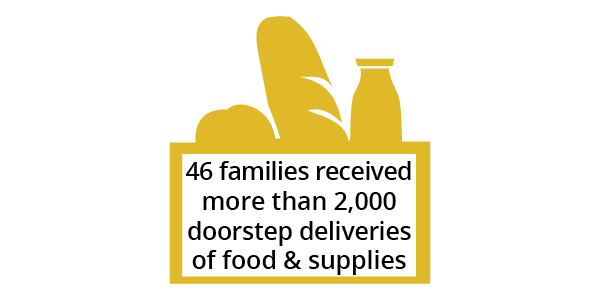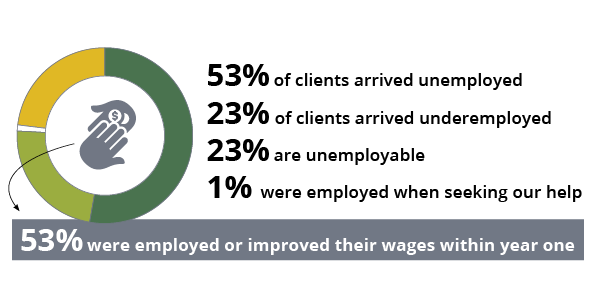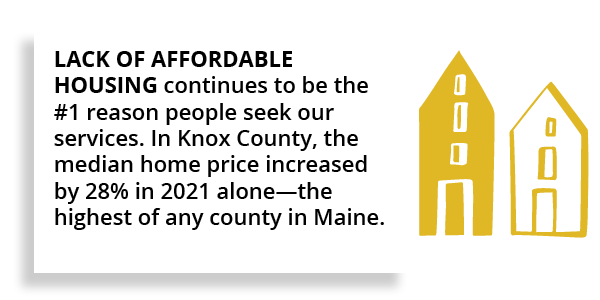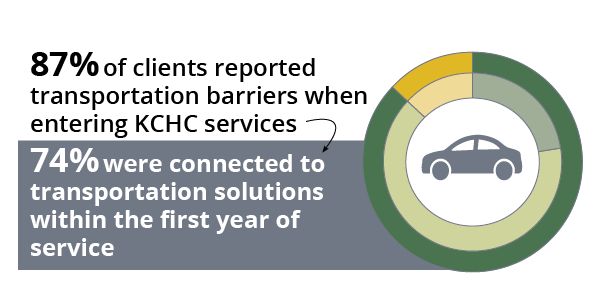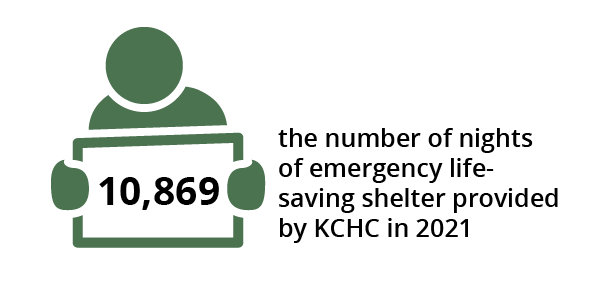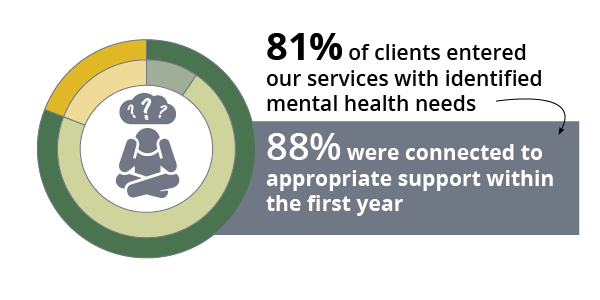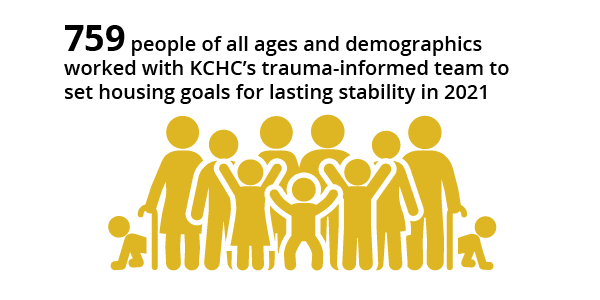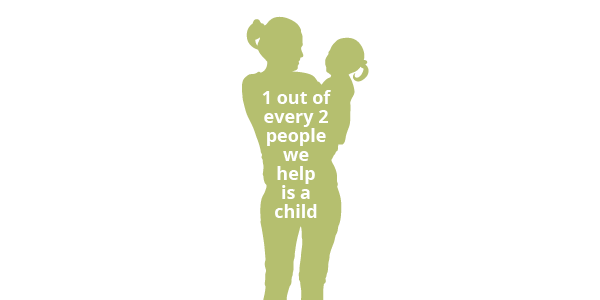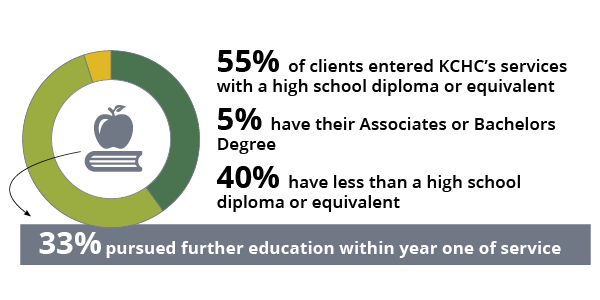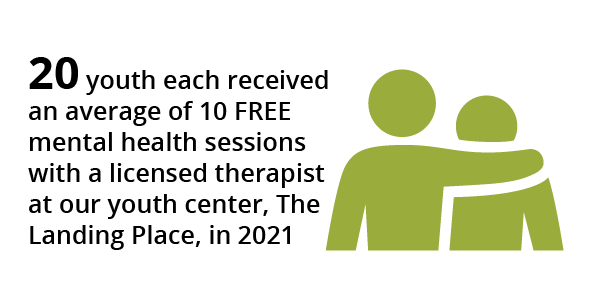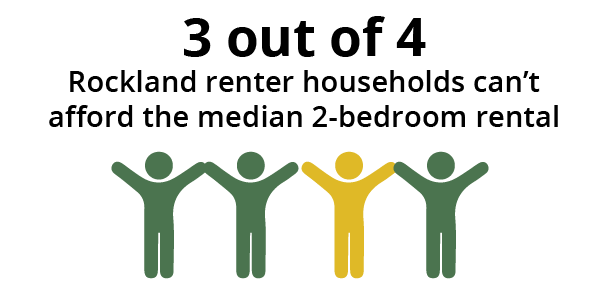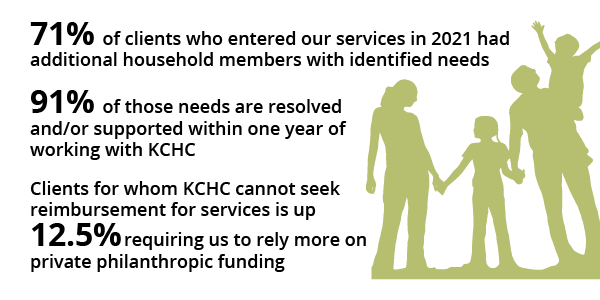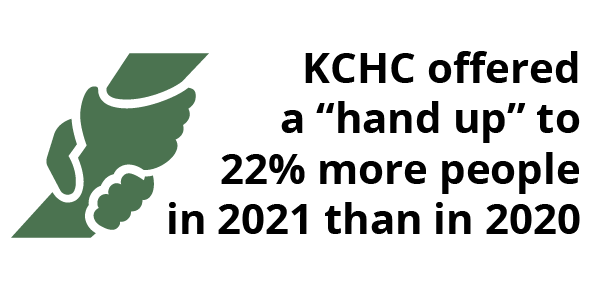
95% of housed clients remain in housing more than 1 year later!
Dear Friends,
As we look back at 2021, we celebrate the hard-working nature of the 759 children, families, and individuals we worked with, day in and day out. Despite the continued challenges of the pandemic and the escalating housing crisis, 46 families in KCHC’s client-care program moved into homes this past year. And, we are thrilled to imagine their sustainable independence one year from now... and into the future.
We also celebrate you—our donors, volunteers, and friends! Community support and private funding provided 62% of the $3.5 million needed for KCHC’s innovative and life-saving work in Knox, Waldo, and Lincoln counties. Your support backed 48 amazing staff who tirelessly and compassionately answered the call, opening doors and hearts to families in need and helping them find housing and achieve their goals.
2021 also marked a significant leap forward in KCHC’s strategic collaborations with local and state partners. Together, we advanced the development of 33 affordable housing units in the Midcoast, as well as strengthened on-the-ground education and prevention programs for local youth and their families.
Last year’s achievements—and our hope for the future—are possible thanks to your generosity. As we look ahead to creating a more equitable, connected community with even more housing, we invite you to keep in touch and lend a hand for positive, systemic change. Let’s build a future where everyone has a safe place to call home.
On behalf of our entire board and staff,
Steph Primm, Executive Director Caroline Morong, Board Chair
affordable housing
In 2021, KCHC’s housing specialists helped 46 families find homes despite the tight housing market in Knox County. And, 35 volunteers gave more than 2,300 hours of service to help KCHC achieve its mission of breaking the cycle of poverty and homelessness in Midcoast Maine.
KCHC is actively working with public and private partners to develop more than 33 new affordable housing units in the Midcoast.
Last year, the affordable housing situation reached crisis levels. KCHC responded swiftly. Collaborating with private and public partners at the state and local level, we began to acquire and develop the three properties below to provide much-needed and varied types of affordable housing options in the Midcoast.
-
KCHC acquired this three-bedroom duplex in Rockland to rent directly to families in need.
-
Plans progressed on the small-footprint housing project with Habitat for Humanity and Maine State Housing Authority. Originally slated for 18 units, the Firefly Field subdivision received city planning board approval for 13 units of affordable rentals and home ownership options to create a diverse neighborhood in Rockland.
-
KCHC, Hope for the Future, LLC, and their collaborative partners started planning an 18-unit affordable housing community in Rockport that—through adaptive reuse of vacant office space—will provide safe housing with on-site access to food, services, job training, and more.
Click below to watch Joy Hollowell’s three-part series showcasing our innovations in affordable housing solutions that aired earlier this year on WABI5 TV.
LACK OF AFFORDABLE HOUSING continues to be the #1 reason people seek our services. In Knox County, the median home price increased by 28% in 2021 alone—the highest of any county in Maine.
3 OUT OF 4 Rockland renter households can’t afford the median 2-bedroom rental.
2021 Client Spotlight: Roland
Roland* came to KCHC seeking housing, but he was also trying to get his life back. For years, Roland had struggled with a variety of health issues but he’d never been homeless until the building he was living in was purchased by out-of-state buyers—it was April 2020.
For the next two years, Roland was forced to move several times. Rents were rising, and he was unable to work and was getting short on cash. When his first pandemic relief check didn’t arrive, Roland learned that the IRS had classified him as deceased. In order to restore his status, his KCHC case manager helped Roland cut through the paperwork over the course of many months, dozens of phone calls, and the help of two senators. His case manager didn’t give up, and neither did he! Roland eventually needed to move away from the Midcoast to find available and affordable housing. He moved to a more southern metropolitan area of Maine and is alive and well, running his own business.
*Names are changed to protect client identities.
shelter solutions
KCHC provided 10,869 nights of life-saving shelter last year representing a 41% increase in shelter bed nights in 2021 over 2020 . . . and the need continues to rise.
KCHC offers programming to prepare families for independent living, as well as space and inspiration for clients and their families to develop their strengths, interests, and skills. About 40% of our clients are seeking homes, and 60% are in post-housing support.
Hospitality House Family Shelter
The Hospitality House in Rockport, “Maine’s homiest homeless shelter,” was once again rated one of the most efficient shelters in Maine and received the highest possible rating during Maine State Housing Authority audits in 2021. Emergency COVID funding was extended through 2021, allowing KCHC to meet increased shelter needs through a combination of hotels, motels, and campgrounds, as well as our family shelter in Rockport.
Transitional Living Program
Our Transitional Living Program in Rockland provided temporary housing and an on-ramp to more permanent, independent housing for six youth, ages 18-24. Read more about our first graduate.
Client Spotlight: Tamara
Facing a winter without adequate heat or water, as well as escalating struggles with parenting, Tamara* sought help from KCHC. Our caring team immediately assisted with resources to address her medical concerns, as well as her son’s behavioral issues which had escalated after the arrest of his father. Tamara says her son is the only reason she’s alive today, and she is thankful the shelter staff helped her “keep fighting.” While at Hospitality House, her son began counseling and she was able to pay off some bills. Tamara received an income-based housing voucher and found an apartment that she furnished with in-kind donations from KCHC. She is pursuing a certification in medical billing and coding that will allow her to provide stability for herself and her son. Debt-free for the first time in her adult life, Tamara has built up her credit with the hope of eventually owning a home. (Note: public funding only covered a portion of the ways we supported Tamara—not the whole person and definitely not the whole family.)
*Names are changed to protect client identities.
Approximately 15% of KCHC’s clients cannot be funded through public programs. We rely on private philanthropic gifts to do the right thing, providing holistic services for whole families across multiple generations.
client-centered care
Photo by Patrisha McLean
In 2021, KCHC’s 11 case managers helped 759 people—within a 40-mile radius of Rockland from Tenants Harbor to Stockton Springs—find housing solutions and reach their personal goals.
759 people of all ages and demographics worked with KCHC’s trauma-informed team to set housing goals for lasting stability in 2021.
While case management is so often a system of referrals, KCHC firmly believes in removing barriers and cutting through red tape. Our compassionate case managers stand by their clients, often staying on the phone or walking through the door with them during moments of trauma and chaos.
In 2021, our team helped clients with emergency supplies, transportation, social and emotional support, furniture for new homes, and much more. With your support, we also provided and wrapped holiday gifts for 157 families!
The Google map (above) is overlaid with circles representing client density by town.
53% of clients arrived unemployed • 23% of clients arrived underemployed • 23% were unemployable • 1% were employed when seeking our help.
53% of those that were unemployed or underemployed became employed or improved their wages within a year of working with KCHC.
55% of clients entered KCHC’s services with a high school diploma or equivalent • 5% have their Associates or Bachelors Degree • 40% have less than a high school diploma or equivalent.
33% of clients pursued further education within one year of service.
87% of clients reported transportation barriers when entering KCHC Services. These barriers could be anything from not having access to a car, to repairs being beyond budget to needing help with acquiring a license or registration.
74% were connected to transportation solutions with in the first year of service.
81% of clients entered our services with identified mental health needs.
88% were connected to appropriate support within the first year.
Client Spotlight: Marjorie
Marjorie* had lived for years in the same apartment—possibly a few too many, as the years had begun to sneak up on her. When KCHC’s client care team stepped into her life, Marjorie was facing both an eviction and a health crisis, with nowhere else to turn. She had been in need of nursing or in-home care for a while but with no natural supports and no one regularly checking in on her to help with daily tasks, the situation had gotten out of hand. Marjorie was given 30 days notice to clear out a home chock full of memories, even as her own cognitive and physical abilities were slipping away.
With a landlord controlling the timeline, KCHC’s team jumped into action despite the fact that Marjorie was not eligible to receive services until she was literally on the street. We supported Marjorie in navigating her options and choosing a solution that would meet her needs as a rural senior. We found her an opening at a nursing home, and we were able to connect her with a volunteer who helped her organize a lifetime of possessions in a matter of days and arrange her most precious belongings in her new space.
*Names are changed to protect client identities.
34% of Maine’s extremely low income renter households are seniors. 58% of them spend more than 50% of their income on rent.
prevention and education
KCHC’s youth program, based at The Landing Place (TLP) in Rockland, builds resilience, resources, and relationships for middle and high school youth.
Outreach
In 2021, TLP served 188 at-risk youth through the youth center and supported 46 of their families with personalized doorstep deliveries to keep several generations nourished in body and spirit. TLP worked with over 60 community partners to identify and nurture youth through building resources and relationships. The Landing Place’s “free store” distributed 1,000 items, from warm clothes to cool bikes.
Free Therapy
Our youth mental health program responded to an urgent need; in 2021 80% of TLP youth surveyed had symptoms of anxiety, and 63% had experienced depression. 20 youth each received an average of 10 FREE mental health sessions with a licensed therapists at our youth center, The Landing Place, in 2021.
Skill Building
Youth received the tools and guidance to help them bring their ideas to life in TLP’s Makerspace and learned how to build a mobile trailer modeled after the distinctive TLP logo. Other opportunities included gardening, field trips, self-care, and healthy relationship building. Community Minded Jobs connected our youth to the community through service opportunities like chopping wood and visiting senior citizens.
TLP provided 200 free therapy sessions to 20 youth in 2021. 45% of referrals came from schools.
2021 Client Spotlight: Jayden
Jayden* (age 19) was working part time and finishing her high school diploma when her family was evicted. She entered TLP’s Transitional Living Program and after four months, she was poised to graduate high school and begin working full time at a job she was excited about. Pursuing her driver’s license, and establishing financial independence were two of her priority goals along with strengthening her support network. She began reaching out to family members and rebuilding relationships. Jayden has dreams of owning her own farm someday.
*Names are changed to protect client identities.
Transportation barriers for youth we serve are particularly severe. A license now requires an often cost-prohibitive driver’s education class and 70 hours of driving practice with a responsible adult—who has a car.
investing in the future
KCHC’s human-centered work cannot be automated or computerized. Research shows that solving homelessness requires an individualized approach; there is no one-size-fits-all solution. More than 50% of KCHC’s clients have families, making the situation exponentially more complex and urgent. In 2021, our 11 case managers responded to the unique needs of more than 272 clients and their families. An investment in KCHC’s innovative, holistic work is an investment in a more hopeful future in the Midcoast.
2021 Annual Budget: $3,579,510
•
2021 Annual Budget: $3,579,510 •
Revenue by Funding Source
Investment by Program
Though we are always conscious of the amount of paper we use, we recognize this is a lot of information and the web format may not be for everyone. Download and print a PDF version of this report here, or if you’d rather, we will gladly mail you a printed copy of the 2021 Community Impact Report.
To have a printed copy sent, please fill out the form below. Thank you once again for your interest in our work and belief in our mission.



